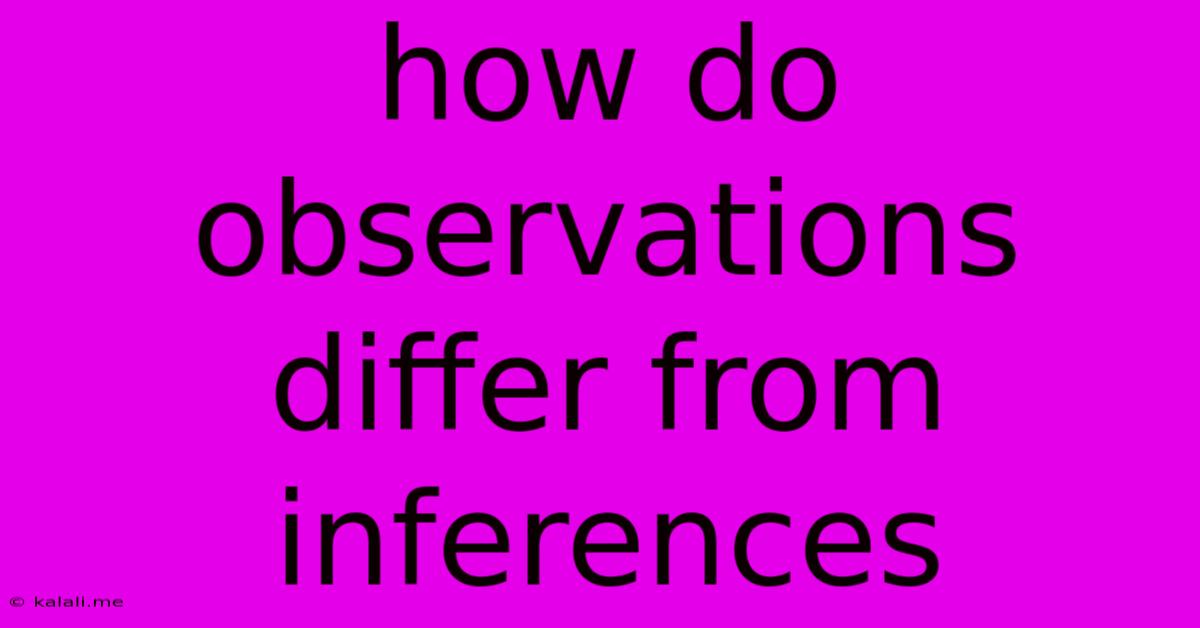How Do Observations Differ From Inferences
Kalali
Jun 14, 2025 · 3 min read

Table of Contents
How Do Observations Differ From Inferences? A Crucial Distinction in Science and Everyday Life
Observations and inferences are two fundamental concepts in scientific inquiry and critical thinking. While they might seem similar at first glance, understanding their differences is crucial for accurate data analysis, sound reasoning, and effective communication. This article delves into the distinctions between observations and inferences, providing clear examples to illustrate their unique characteristics. Learning to differentiate them will significantly improve your ability to interpret information and draw valid conclusions.
Observations are direct, sensory experiences. They are what you see, hear, smell, taste, or touch. Inferences, on the other hand, are interpretations or explanations based on observations. They are conclusions drawn from evidence, often involving some degree of uncertainty. The key difference lies in the level of interpretation involved.
What is an Observation?
An observation is a statement describing a fact. It is objective, meaning it's based on factual data rather than personal feelings or opinions. Good observations are detailed and specific, avoiding vague or subjective language. Consider these examples:
- Objective Observation: "The liquid in the beaker is blue and has a volume of 100ml."
- Subjective Observation (to be avoided): "The liquid in the beaker is a pretty blue."
- Detailed Observation: "The bird has bright red feathers on its head, brown wings, and a long, pointed beak."
- Vague Observation (to be avoided): "The bird is pretty."
Observations are the building blocks of scientific inquiry. They form the basis for formulating hypotheses and testing theories. Accurate and thorough observations are essential for reliable scientific conclusions. Remember, observations are about describing what you directly perceive, not what you think it means.
What is an Inference?
An inference is an interpretation or explanation based on observations and prior knowledge. It's a logical conclusion, but it's not a direct observation. Inferences can be correct or incorrect, depending on the accuracy of the observations and the validity of the reasoning. Here are some examples:
- Observation: "The ground is wet."
- Inference: "It must have rained." (Other possibilities exist, like a sprinkler or a leaky pipe).
- Observation: "The plant is wilting."
- Inference: "The plant needs water." (Other possibilities include disease or insufficient sunlight).
- Observation: "The cat is hissing and its fur is standing on end."
- Inference: "The cat feels threatened." (It could also be playful, but the observations suggest threat).
Inferences involve a leap of logic, combining what you observe with your existing understanding to arrive at a possible explanation. While inferences are important for understanding and making predictions, it's crucial to acknowledge that they are not definitive truths. Always consider alternative interpretations.
The Importance of Differentiating Observations from Inferences
The ability to distinguish between observations and inferences is vital for several reasons:
- Improving Critical Thinking: It helps you evaluate evidence objectively and avoid jumping to conclusions.
- Enhancing Scientific Method: Accurate observations are essential for reliable scientific research.
- Effective Communication: Clearly separating observations from inferences prevents misunderstandings and improves the clarity of your communication.
- Problem Solving: Differentiating between facts and interpretations aids in effective problem-solving.
In conclusion, while both observations and inferences are important elements of thinking and understanding, they represent distinct cognitive processes. Observations are direct sensory experiences, whereas inferences are interpretations based on those observations and prior knowledge. By understanding and appreciating this crucial difference, you can significantly improve your critical thinking skills and arrive at more accurate and reliable conclusions.
Latest Posts
Latest Posts
-
The Asteroid Belt Lies Between The Orbits Of
Jun 15, 2025
-
Milk Of Magnesia Base Or Acid
Jun 15, 2025
-
Is H2po4 An Acid Or Base
Jun 15, 2025
-
The End Product Of Protein Digestion Is
Jun 15, 2025
-
The Speed Of A Printer Is Measured In
Jun 15, 2025
Related Post
Thank you for visiting our website which covers about How Do Observations Differ From Inferences . We hope the information provided has been useful to you. Feel free to contact us if you have any questions or need further assistance. See you next time and don't miss to bookmark.